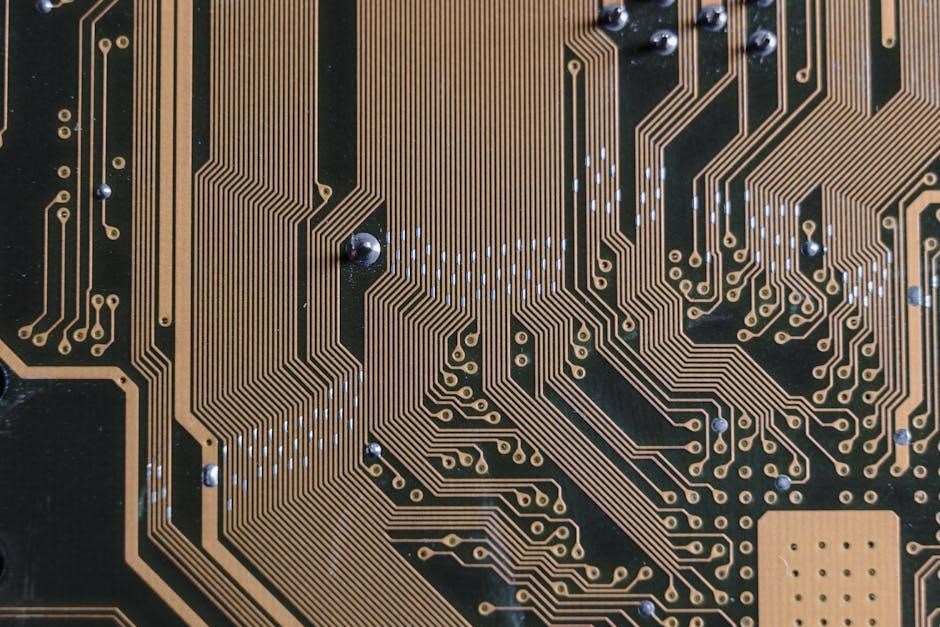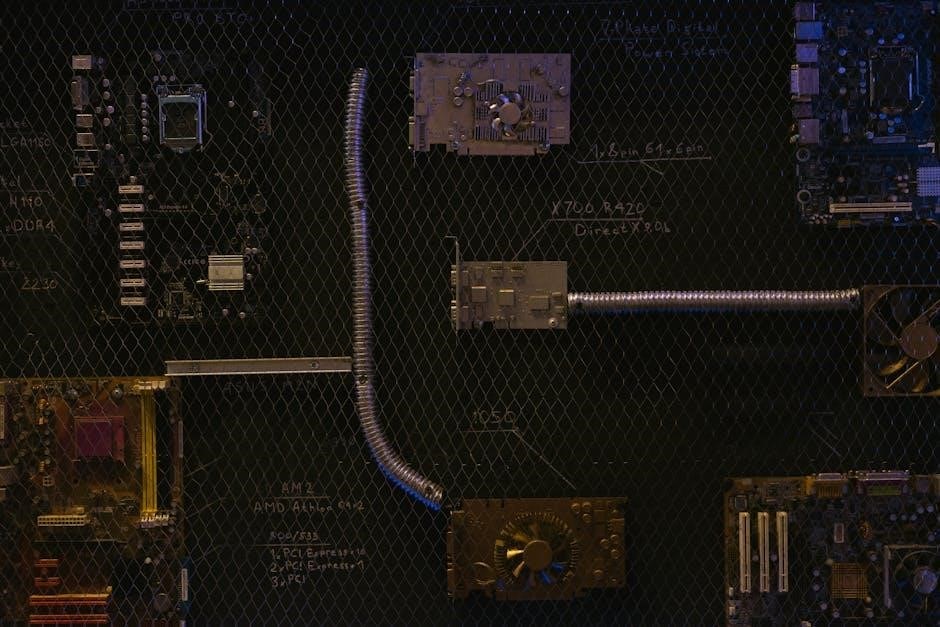Electrical engineering is a dynamic field that applies scientific and mathematical principles to design, develop, and maintain electrical systems, encompassing electricity, electronics, and electromagnetism.
1.1. Definition and Scope of Electrical Engineering
Electrical engineering is a professional discipline that focuses on the study, design, development, and application of electrical systems, devices, and technologies. It encompasses the principles of electricity, electronics, and electromagnetism to create innovative solutions for modern challenges. The scope of electrical engineering is vast, covering fields such as power generation and distribution, telecommunications, computer systems, and consumer electronics. Electrical engineers work on designing electrical circuits, integrated chips, and electronic assemblies, ensuring efficient energy use and information transmission. The field also extends to emerging areas like renewable energy, smart grids, and artificial intelligence, making it a cornerstone of technological advancement. Electrical engineering impacts nearly every aspect of daily life, from lighting and communication to transportation and healthcare.
1.2. Historical Development of Electrical Engineering
The origins of electrical engineering can be traced back to the late 19th century, when the understanding of electricity and its applications began to expand rapidly. Early advancements in telegraphy and telephony laid the foundation for the field. The “War of Currents” between Thomas Edison and Nikola Tesla marked a pivotal moment, establishing alternating current (AC) as the standard for power distribution. The 20th century saw significant progress, with contributions to radio communication, electronics, and power systems. Over time, the field diversified into specialized areas such as microelectronics, computer engineering, and renewable energy. Today, electrical engineering continues to evolve, driving technological innovations in fields like artificial intelligence, smart grids, and sustainable energy solutions, making it a cornerstone of modern progress.
1.3. The Role of Electrical Engineers in Modern Society
Electrical engineers play a vital role in modern society by designing, developing, and maintaining electrical systems that power our world. From energy generation to telecommunications, their work ensures reliable and efficient systems. They contribute to advancements in consumer electronics, medical devices, and renewable energy technologies. Electrical engineers also address global challenges such as energy sustainability and climate change by innovating in smart grids and renewable energy solutions. Their expertise enables the development of emerging technologies like artificial intelligence and the Internet of Things. By integrating technical knowledge with problem-solving skills, electrical engineers drive innovation and improve quality of life, making them indispensable in shaping a technologically advanced future. Their impact is felt across industries, ensuring progress and sustainability in an increasingly interconnected world.

Key Concepts and Theories in Electrical Engineering
Electrical engineering relies on foundational concepts like electric circuits, Kirchhoff’s laws, Ohm’s Law, electromagnetic fields, and power systems. These theories form the backbone of modern electrical systems.
2.1. Electric Circuits and Network Analysis
Electric circuits and network analysis are foundational concepts in electrical engineering, involving the study of how electric currents flow through circuits. Key principles include Kirchhoff’s Voltage and Current Laws, Ohm’s Law, and Thevenin/Norton equivalents. These tools enable engineers to analyze and design complex electrical networks, ensuring efficiency and safety. Circuit analysis also covers AC/DC circuits, impedance, and resonance. Modern software tools like SPICE simulate circuit behavior, aiding in precise design and troubleshooting. Understanding these concepts is crucial for developing power systems, electronic devices, and communication networks. Engineers use network analysis to optimize energy distribution and minimize losses. This knowledge forms the basis for advanced topics in power electronics and telecommunications, emphasizing the importance of robust circuit design in modern technology.
2.2. Electromagnetic Fields and Waves
Electromagnetic fields and waves are fundamental to electrical engineering, describing how electric and magnetic forces interact. Maxwell’s Equations unify these phenomena, explaining wave propagation. These principles are crucial for antennas, communication systems, and power transformers, enabling technologies like radar and wireless communication. Electromagnetic waves, classified by frequency, include radio waves, microwaves, and X-rays, each with unique applications. Understanding wave behavior in different media is vital for designing waveguides and optical fibers. Electromagnetic compatibility ensures devices don’t interfere, using shielding and filtering. Advances in materials and photonics continue to expand applications, making this field essential for modern engineering innovations.
2.3. Power Systems and Transmission
Power systems and transmission involve the generation, distribution, and delivery of electrical energy. Modern power systems rely on smart grids, which integrate renewable energy sources and enhance efficiency. Key components include power plants, transformers, and transmission lines that transport electricity over long distances. Power electronics play a crucial role in converting and controlling energy flow. The design of power systems ensures reliability, stability, and safety, addressing challenges like power losses and environmental impact; Advances in technology, such as high-voltage direct current (HVDC) systems, improve transmission efficiency. These systems are essential for meeting global energy demands while promoting sustainability and resilience in the energy infrastructure.

Applications of Electrical Engineering
Electrical engineering drives innovations in power generation, telecommunications, consumer electronics, and embedded systems, impacting daily life through advanced technologies and sustainable energy solutions.
3.1. Power Generation and Distribution
Electrical engineering plays a pivotal role in power generation and distribution, ensuring the efficient delivery of electricity to meet global energy demands. From renewable energy sources like solar, wind, and hydroelectric power to traditional methods such as thermal and nuclear plants, electrical engineers design and optimize systems to generate electricity. The distribution process involves transmitting power through high-voltage lines to substations, where it is transformed to lower voltages for safe consumer use. Advances in smart grids and energy storage systems, such as batteries, enhance reliability and reduce energy losses. Electrical engineers also work on integrating distributed energy resources and microgrids, promoting sustainability and resilience in power systems. Their work ensures reliable and efficient electricity supply, crucial for modern society.
3.2. Telecommunications and Signal Processing
Telecommunications and signal processing are integral to modern communication systems, relying on electrical engineering principles to transmit and process information; Electrical engineers design and optimize communication systems, including wireless networks, satellite communications, and fiber-optic links. They develop technologies like modulation, encoding, and decoding to ensure data integrity and efficient transmission. Signal processing techniques, such as filtering and compression, enhance the quality and security of digital signals. Applications range from mobile phones and internet connectivity to radar systems and navigation technologies. Advances in machine learning and artificial intelligence further improve signal processing algorithms, enabling faster and more reliable data transmission. These innovations drive global communication, making electrical engineers pivotal in shaping the future of telecommunications and data exchange.
3.3. Consumer Electronics and Embedded Systems
Consumer electronics and embedded systems are pivotal in modern life, driven by electrical engineering innovations. These systems integrate microcontrollers, sensors, and software to create intelligent devices. Applications include smartphones, smart home devices, wearable technology, and IoT (Internet of Things) solutions. Electrical engineers design energy-efficient, compact, and high-performance circuits for these devices. Embedded systems, such as those in automotive and industrial automation, rely on real-time processing and low-power consumption. Advances in semiconductor technology and firmware development enable smarter, user-friendly products. The field also encompasses audio-visual systems, gaming consoles, and personal computers. As demand for connectivity and automation grows, electrical engineers play a key role in shaping the future of consumer electronics and embedded systems, ensuring seamless integration into daily life.

Educational Pathways in Electrical Engineering
Electrical engineering education typically begins with a Bachelor’s degree, followed by optional advanced degrees and certifications, requiring strong problem-solving and mathematical skills.
4.1. Bachelor’s Degree in Electrical Engineering
A Bachelor’s degree in Electrical Engineering provides a foundational education in mathematics, natural sciences, and engineering principles. It typically includes core courses in electric circuits, digital systems, and electromagnetism, preparing students for diverse careers. Many programs offer specializations, such as power systems, embedded systems, or telecommunications. Practical experience is often gained through labs and projects, emphasizing problem-solving and design skills. Graduates are equipped to work in industries like aerospace, energy, and consumer electronics or pursue advanced studies. The degree ensures a strong technical understanding, enabling students to tackle real-world challenges in electrical and electronic systems.

4.2. Advanced Degrees and Specializations
Advanced degrees in Electrical Engineering, such as Master’s and Ph.D. programs, offer specialized knowledge in cutting-edge fields. These programs allow students to delve into areas like power electronics, renewable energy, or telecommunications. Specializations enable graduates to tailor their expertise to emerging technologies, enhancing their career prospects. Research-focused degrees often involve thesis work, preparing students for academia or R&D roles. Interdisciplinary programs, such as biomedical engineering or nanotechnology, further broaden opportunities. Advanced degrees are ideal for those seeking leadership roles or innovative contributions to the field; They provide a deeper understanding of complex systems and technologies, equipping engineers to address global challenges in energy, communication, and beyond.
4.3. Skills and Knowledge Required for Electrical Engineers
Electrical engineers require a strong foundation in mathematics and physics, particularly in areas like circuits, electromagnetism, and electronics. Proficiency in problem-solving and analytical thinking is essential for designing and optimizing electrical systems. Hands-on experience with simulation tools, such as SPICE or MATLAB, is also critical. Knowledge of programming languages like Python or C++ is increasingly important for embedded systems and automation. Additionally, understanding of power systems, control systems, and signal processing is vital. Communication and teamwork skills are necessary for collaborating on projects and presenting solutions. Staying updated on emerging technologies, such as renewable energy and smart grids, is crucial for adaptability. Attention to detail and the ability to troubleshoot complex issues further enhance an engineer’s effectiveness in this dynamic field.

Research and Development in Electrical Engineering
Research in electrical engineering focuses on advancing technologies like smart grids, renewable energy, and power electronics, driving innovation to address global challenges and enhance societal infrastructure.
5.1. Emerging Technologies in Electrical Engineering
Emerging technologies in electrical engineering are transforming industries through innovations like smart grids, renewable energy systems, and advanced power electronics. Artificial intelligence (AI) and machine learning are being integrated into power distribution and consumption forecasting, optimizing energy efficiency. The Internet of Things (IoT) enables real-time monitoring and control of electrical systems, enhancing reliability and performance. Quantum computing is expected to revolutionize circuit design and optimization, while 5G telecommunications are advancing signal processing and communication networks. Additionally, electric vehicles and energy storage solutions are driving demand for better battery technologies. These advancements are reshaping the field, addressing global challenges like sustainability and energy accessibility, and paving the way for a more connected and efficient future.
5.2. Research Opportunities for Undergraduate Students
Undergraduate students in electrical engineering have numerous research opportunities to engage in cutting-edge projects, fostering innovation and practical learning. Many universities offer stipends for summer and semester-long research programs, allowing students to work alongside professors in state-of-the-art labs. Areas of focus include power electronics, renewable energy, and IoT applications. Students can explore emerging technologies like smart grids and energy storage systems, gaining hands-on experience with advanced tools and software. These opportunities not only enhance technical skills but also encourage interdisciplinary collaboration, preparing students for future careers in academia or industry. Participating in research projects enables undergraduates to contribute to real-world solutions while building a strong foundation for advanced studies or professional roles in electrical engineering. Such experiences are invaluable for developing problem-solving abilities and a deeper understanding of the field.
5.3. Innovation in Power Electronics and Renewable Energy
Innovation in power electronics is revolutionizing how energy is generated, transmitted, and utilized, particularly in renewable energy systems. Advances in power electronic devices, such as inverters and converters, enable efficient energy management in solar and wind power systems. These technologies optimize energy flow, reduce losses, and enhance overall system reliability. Additionally, the integration of energy storage systems, like batteries, addresses the intermittency of renewable sources, ensuring a stable power supply. Smart grid technologies further complement these innovations by optimizing energy distribution and consumption. Collaborative efforts between industries and academia are driving these advancements, aiming to create sustainable and efficient energy solutions. Such innovations are critical for meeting global energy demands while reducing environmental impact, paving the way for a greener and more sustainable future.

Career Opportunities in Electrical Engineering
Electrical engineers find diverse opportunities in industries like aerospace, communications, power distribution, and consumer electronics. Roles span design, development, research, and management, impacting daily life through innovation.
6.1. Industries Hiring Electrical Engineers
Electrical engineers are in demand across diverse industries, including aerospace, communications, computer systems, power distribution, consumer electronics, biomedical engineering, and military sectors. These professionals contribute to designing and improving electrical systems, from navigation systems in aerospace to communication technologies. The power distribution industry relies on engineers to ensure efficient energy transmission, while consumer electronics and biomedical fields leverage their expertise for innovative devices. Additionally, the military sector employs electrical engineers for advanced defense technologies. With emerging technologies driving growth, the demand for skilled engineers continues to rise, offering a wide range of roles from design and development to research and management. This versatility ensures electrical engineers remain integral to various industries, shaping modern advancements and societal progress.
6.2. Job Roles and Responsibilities
Electrical engineers are responsible for designing, developing, and maintaining electrical systems, including circuits, electronics, and electromechanical devices. Their roles involve analyzing project requirements, conducting simulations, and testing prototypes to ensure functionality and safety. They collaborate with multidisciplinary teams to integrate electrical components into larger systems, such as power grids or communication networks. Additionally, they troubleshoot issues, optimize system performance, and ensure compliance with industry standards and regulations. Electrical engineers also oversee production processes and manage projects from concept to implementation. Strong problem-solving skills, attention to detail, and the ability to communicate complex ideas are essential. As technology evolves, their responsibilities expand to include emerging areas like renewable energy and smart systems, requiring continuous learning and adaptation to new challenges.

6.3. Professional Growth and Leadership in Electrical Engineering
Electrical engineers have ample opportunities for professional growth, advancing into leadership roles that shape the future of technology and infrastructure. As they gain experience, they often transition into management positions, overseeing large-scale projects and teams. Leadership in electrical engineering involves guiding innovation, fostering collaboration, and making strategic decisions that impact industries like energy, telecommunications, and electronics. Continuous learning is crucial, as engineers must stay updated on emerging technologies such as renewable energy and smart systems. Mentorship and participation in professional organizations further enhance leadership skills, enabling engineers to influence industry standards and policies. Through dedication and expertise, electrical engineers can rise to prominent roles, driving technological advancements and contributing to global sustainability efforts.

Future Trends in Electrical Engineering
Future trends in electrical engineering include advancements in renewable energy systems, smart grid technologies, and the integration of artificial intelligence for efficient power management and sustainability.
7.1. The Impact of Artificial Intelligence and Machine Learning
Artificial intelligence (AI) and machine learning (ML) are revolutionizing electrical engineering by enhancing power systems, improving fault detection, and optimizing energy management. AI algorithms enable predictive maintenance, reducing downtime in electrical networks. ML models optimize energy consumption patterns, ensuring efficient resource allocation. In smart grids, AI balances supply and demand dynamically, integrating renewable energy sources seamlessly. These technologies also improve signal processing, enabling better communication systems. Robotics and automation, driven by AI, enhance manufacturing and assembly processes. Overall, AI and ML are transforming electrical engineering, driving innovation and sustainability in power systems and beyond.
7.2. Advancements in Smart Grids and Energy Systems
Smart grids and advanced energy systems are transforming the electrical engineering landscape by integrating renewable energy sources, improving efficiency, and enhancing reliability. The adoption of IoT-enabled devices and AI-driven analytics allows real-time monitoring and optimized energy distribution. Smart grids enable two-way communication between utilities and consumers, promoting demand response and energy conservation. Advances in energy storage systems, such as batteries, ensure stability and reduce power losses. Additionally, microgrids and decentralized power systems are gaining traction, offering resilience during outages. These innovations are driving a sustainable and flexible energy future, ensuring cleaner and more efficient power delivery. They also support the integration of electric vehicles and renewable energy, making energy systems smarter and greener.

7.3. The Role of Electrical Engineering in Sustainability
Electrical engineering plays a pivotal role in advancing sustainability by developing innovative solutions to reduce carbon footprints and promote green technologies. Engineers design renewable energy systems, such as solar, wind, and hydroelectric power, to replace fossil fuels. Smart grids and energy-efficient systems optimize power distribution, minimizing energy waste. Advances in energy storage, like batteries, ensure stable renewable energy integration. Electrical engineers also work on sustainable infrastructure, including electric vehicle charging systems and energy-efficient buildings. By addressing global challenges like climate change, electrical engineering drives the transition to a sustainable future, ensuring cleaner energy and reducing environmental impact. These efforts are critical for meeting global sustainability goals and creating a greener planet for future generations.



